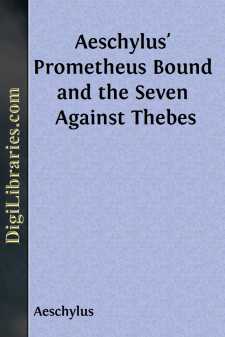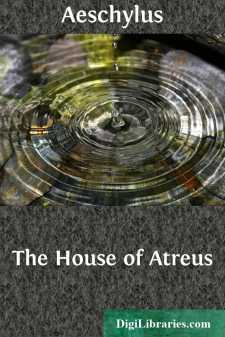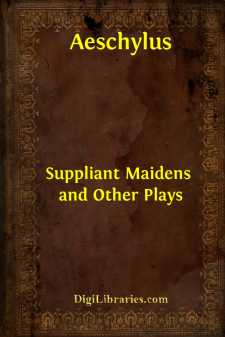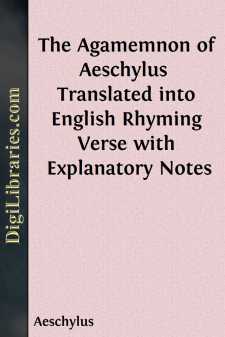Categories
- Antiques & Collectibles 13
- Architecture 36
- Art 48
- Bibles 22
- Biography & Autobiography 813
- Body, Mind & Spirit 142
- Business & Economics 28
- Children's Books 17
- Children's Fiction 14
- Computers 4
- Cooking 94
- Crafts & Hobbies 4
- Drama 346
- Education 46
- Family & Relationships 57
- Fiction 11829
- Games 19
- Gardening 17
- Health & Fitness 34
- History 1377
- House & Home 1
- Humor 147
- Juvenile Fiction 1873
- Juvenile Nonfiction 202
- Language Arts & Disciplines 88
- Law 16
- Literary Collections 686
- Literary Criticism 179
- Mathematics 13
- Medical 41
- Music 40
- Nature 179
- Non-Classifiable 1768
- Performing Arts 7
- Periodicals 1453
- Philosophy 64
- Photography 2
- Poetry 896
- Political Science 203
- Psychology 42
- Reference 154
- Religion 513
- Science 126
- Self-Help 84
- Social Science 81
- Sports & Recreation 34
- Study Aids 3
- Technology & Engineering 59
- Transportation 23
- Travel 463
- True Crime 29
Aeschylus' Prometheus Bound and the Seven Against Thebes
by: Aeschylus
Categories:
Description:
Excerpt
INTRODUCTION.
Æschylus, the first of the great Grecian writers of tragedy, was born at Eleusis, in 525 B.C. He was the son of Euphorion, who was probably a wealthy owner of rich vineyards. The poet's early employment was to watch the grapes and protect them from the ravages of men and other animals, and it is said that this occupation led to the development of his dramatic genius. It is more easy to believe that it was responsible for the development of certain other less admirable qualities of the poet.
His first appearance as a tragic writer was in 499 B.C., and in 484 B.C. he won a prize in the tragic contests. He took part in the battle of Marathon, in 490 B.C., and also fought in the battle of Salamis, in 480 B.C. He visited Sicily twice, and probably spent some time in that country, as the use of many Sicilian words in his later plays would indicate.
There is a curious story related as to his death, which took place at Gela in 456 B.C. It is said that an eagle, mistaking his bald head for a stone, dropped a tortoise upon it in order to break its shell, and that the blow quite killed Æschylus. Too much reliance should not be placed upon this story.
It is not known how many plays the poet wrote, but only seven have been preserved to us. That these tragedies contain much that is undramatic is undoubtedly true, but it must be remembered that at the time he wrote, Æschylus found the drama in a very primitive state. The persons represented consisted of but a single actor, who related some narrative of mythological or legendary interest, and a chorus, who relieved the monotony of such a performance by the interspersing of a few songs and dances. To Æschylus belongs the credit of creating the dialogue in the Greek drama by the introduction of a second actor.
In the following pages will be found a translation of two of the poet's greatest compositions, viz., the "Prometheus Chained" and the "Seven Against Thebes." The first of these dramas has been designated "The sublimest poem and simplest tragedy of antiquity," and the second, while probably an earlier work and containing much that is undramatic, presents such a splendid spectacle of true Grecian chivalry that it has been regarded as the equal of anything which the author ever attempted.
The characters represented in the "Prometheus" are Strength, Force, Vulcan, Prometheus, Io, daughter of Inachus, Ocean and Mercury. The play opens with the appearance of Prometheus in company with Strength, Force and Vulcan, who have been bidden to bind Prometheus with adamantine fetters to the lofty cragged rocks of an untrodden Scythian desert, because he has offended Jupiter by stealing fire from heaven and bestowing it upon mortals.
Vulcan is loth to obey the mandates of Jove, but urged on by Strength and Force and the fear of the consequences which disobedience will entail, with mighty force drives the wedges into the adamantine rocks and rivets the captive with galling shackles to the ruthless crags.
Prometheus, being bound and left alone, bemoans his fate and relates to the chorus of nymphs the base ingratitude of Jove, who through his counsels having overwhelmed the aged Saturn beneath the murky abyss of Tartarus, now rewards his ally with indignities because he had compassion upon mortals....





